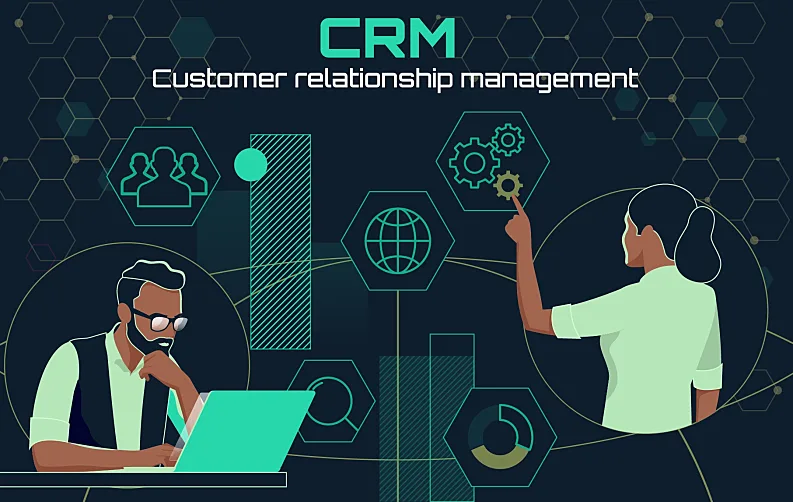
- Understanding Custom CRM Development Costs
- Factors Influencing Custom CRM Development Cost
- Estimating Custom CRM Development Cost
- Budgeting for Ongoing Maintenance and Support
- Breakdown of Custom CRM Development Features
- Strategies to Reduce Custom CRM Development Cost
- Future Trends in Custom CRM Development Costs
- Conclusion

Customer relationship management (CRM) systems have become essential for organizations aiming to streamline operations, enhance customer satisfaction, and drive growth. It is well-documented that CRM provides significant benefits. For instance, research by Nucleus found that for every dollar spent on CRM, companies get $8.71 in return - 1.5 times more than just three years ago.
According to Statista, annual revenue growth from CRM systems is projected at 10.59% through 2028, resulting in a market volume of $131.90 billion. As businesses increasingly recognize CRM's value, many customize CRM solutions to meet unique needs. However, custom CRM software development costs can vary greatly depending on several factors.
Understanding Custom CRM Development Costs
A bespoke CRM development can cost between $30,000 and $300,000. However, the costs will vary depending on several factors. Understanding these key elements is essential for making informed decisions and managing resources effectively.
This section explores the factors that impact custom CRM development costs. It discusses the process of estimating these expenses and emphasizes the necessity of budgeting for continuous maintenance and support.
Factors Influencing Custom CRM Development Cost
Here are the several factors that influence the CRM software development cost:
| Factor | Description | Cost Range |
|---|---|---|
| Features and Complexity | Essential functions such as managing contacts and tracking leads cost between $5,000 and $10,000. Advanced features like sales prediction, automated marketing, and AI-driven analytics can range from $20,000 to $50,000 or more. | $5,000 - $50,000+ |
| Integrations | Simple integrations may cost between $1,000 and $5,000, while more complex ones often exceed $10,000. The complexity of the integrations and the number of systems involved influence costs. | $1,000 - $10,000+ |
| Customization Level | A highly tailored solution that aligns closely with unique business processes and workflows requires more development effort and expertise, resulting in higher costs. | Varies based on requirements |
| Development Team | In-house development teams in the US may lead to higher costs, with annual salaries ranging from $80,000 to $120,000. Outsourcing or collaborating with freelancers can be more budget-friendly, with hourly rates from $50 to $150. | $50 - $150/hr or $80,000 - $120,000/year |
1. Features and Complexity
The functionalities and features needed in a customized CRM system directly impact the development expenses. Essential functions such as managing contacts and tracking leads typically cost between $5,000 and $10,000.
On the other hand, advanced features like sales prediction, automated marketing, and AI-driven analytics can range from $20,000 to $50,000 or more. The intricacy of these characteristics, encompassing their design, execution, and integration with current systems, also plays a role in determining the total expenses.
2. Integrations
Integrating a custom CRM with various systems like ERP, marketing automation platforms, or social media platforms can lead to a significant increase in development costs. The complexity of the integrations, the number of systems involved, and the necessity for custom API development all play a role in driving up expenses. While simpler integrations may fall within the range of $1,000 to $5,000, more intricate ones often exceed $10,000.
3. Customization Level
The customization required for your CRM system will also affect the costs. If you need a highly tailored solution that aligns closely with your unique business processes and workflows, it will require more development effort and expertise, resulting in higher costs.
4. Development Team
The location of the development team influences the expense of developing a custom CRM. Opting for an in-house team in the US can lead to high costs, with annual salaries for skilled developers ranging from $80,000 to $120,000.
On the other hand, outsourcing to a development firm or collaborating with freelancers can offer a more budget-friendly approach, with hourly rates varying from $50 to $150 based on team location and expertise.
Estimating Custom CRM Development Cost
Getting a precise estimate for customizing a CRM system requires consulting with software development companies specializing in CRM development. These experts can review your needs, explain the development steps involved, and provide a cost breakdown with details. When getting an estimate, some important cost aspects to consider include:
| Aspect | Description | Cost Considerations |
|---|---|---|
| Development Hours | Development hours needed for planning, design, development, testing, and deployment might range from 1,000–5,000 hours depending on complexity. | 1,000–5,000 hours |
| Technology Stack | Costs can vary significantly based on technology choice, programming languages, frameworks, databases, etc.. Additionally, proprietary solutions may have high licensing fees. | Varies greatly; licensing fees for proprietary technologies can exceed $10,000. |
| Third-Party Integrations | Includes costs for API integration, data synchronization, and subscriptions or licenses for integrating with third-party tools or services, like HubSpot or Marketo. | $45 - $900 monthly (based on business size) |
1. Development Hours
Based on your requirements, the development team will estimate the hours needed to build your custom CRM. This includes planning, design, development, testing, and deployment time. Development hours can range from 1,000–5,000 hours, depending on the project's complexity.
2. Technology Stack
The selection of a technology stack (e.g., programming languages, frameworks, databases) can have a direct impact on developmental expenses. Certain technologies may necessitate specific expertise or involve higher licensing fees. For instance, opting for a proprietary CRM framework might result in licensing costs exceeding $10,000, whereas open-source options like PHP or Python offer substantial cost savings.
3. Third-Party Integrations
Integrating your custom CRM with third-party tools or services will incur additional costs. These may include expenses for API integration, data synchronization, and any necessary subscriptions or licenses. Integrating with a popular marketing automation platform like HubSpot or Marketo can cost between $45- $900 monthly (depending on business size) in setup and ongoing fees.
Budgeting for Ongoing Maintenance and Support
Maintaining a customer relationship management (CRM) system requires continuous investment beyond the initial implementation. It is important to budget for the long-term needs of upkeep, upgrades, trouble shooting, and customer assistance on an ongoing basis. There are several factors to consider:
| Aspect | Description | Cost Range |
|---|---|---|
| Maintenance and Updates | Allocated for routine maintenance tasks like upgrading software, applying security patches, and optimizing performance. Costs vary based on the CRM system's size and complexity. | A few hundred to several thousand dollars monthly. |
| Customer Support | Expenses related to staff salaries, training, and tools for support services. External customer support services can range between $500 to $5,000 per month. | $500 to $5,000 per month |
| Scalability and Future Enhancements | Budget for future enhancements, features, and integrations to meet the organization's changing needs. | Varies based on enhancements |
1. Maintenance and Updates
Ensure that a part of the budget is allocated for routine maintenance tasks, such as upgrading software, applying security patches, and optimizing performance. The costs can vary, ranging from a few hundred to several thousand dollars monthly, depending on the size and intricacy of your CRM system.
2. Customer Support
Maintaining continuous customer assistance is essential for the smooth functioning of a personalized CRM system. It is important to factor in the expenses related to staff salaries, training, and necessary tools for support services. Opting for external customer support services from a third party can often lead to cost savings, typically ranging between $500 to $5,000 per month based on the level of assistance needed.
3. Scalability and Future Enhancements
Your custom CRM system may need to scale and adapt as your business grows. Be prepared to budget for future enhancements, features, and integrations that may be needed to meet the changing needs of your organization.
Breakdown of Custom CRM Development Features
Custom CRM software development involves various components and features that contribute to the overall functionality and effectiveness of the system. Let's break down the key components and features of custom CRM system development:
1. Contact Management
Contact management allows businesses to store customer info like names, addresses, and emails. It also keeps a record of communication history. Maintaining a central customer database helps companies have efficient communication and personalized interactions.
2. Lead Management and Sales Pipeline
Lead management and sales pipeline features enable businesses to track and nurture leads. This includes lead capture, scoring, distribution, and tracking progress through sales funnel stages. These features help sales prioritize efforts, identify bottlenecks, and optimize strategies.
3. Opportunity and Deal Tracking
Opportunity and deal tracking allow businesses to monitor and manage potential sales. This includes stages, assigning tasks, and setting reminders. These features provide insights into the sales pipeline, enabling teams to make data-driven decisions and forecast revenue.
4. Reporting and Analytics
Customer behavior, sales, and marketing reports help businesses make decisions; that’s why custom CRM systems must include sales, customer, campaigns, and data reports, as these features help using real-time data for decision making.
5. Workflow Automation
Automation streamlines repetitive tasks like assigning leads, triggering email campaigns, updating deal stages, and generating notifications. This feature reduces manual effort, minimizes errors, and improves productivity.
6. Third-Party Integrations
Integrating your custom CRM with third parties enhances functionality, allowing seamless data sharing. Common third-party integrations include email, marketing automation, social media, and accounting software.
7. Mobile Accessibility
Mobile accessibility for your CRM system allows sales teams to access customer data, update information, and perform critical tasks through mobile devices like phones and tablets. This component improves productivity and responsiveness as teams can work on the go.
8. Custom Dashboards and User Interface
Custom dashboards tailored to your specific business needs can greatly enhance the usability of your CRM system. This involves intuitive layouts, personalized views, and interactive visuals that provide quick insights. A well-designed interface improves experience, reduces training, and increases efficiency.
9. Security and Access Control
Ensuring customer data security is key for any CRM. Features include user login, limiting access by role, encrypting data, and viewing logins. These safeguard sensitive info, block unauthorized access and follow industry standards.
Strategies to Reduce Custom CRM Development Cost
Developing a CRM system can be a huge investment, but strategies can reduce costs without affecting quality or features. Here are the approaches to minimize expenses with custom CRM development.
1. Prioritizing Features and Functionalities
Identify core features contributing to business goals for maximum value while planning to build a custom CRM. Avoid unnecessary 'nice-to-have' features initially; consider them for future iterations post-establishing the core system.
2. Opting for Agile Development Methodology
Another cost-saving approach is adopting an Agile development methodology to Create custom CRM software, emphasizing iterative and incremental cycles. This flexible method allows better cost control compared to the traditional Waterfall model. Breaking down projects into manageable sprints helps gather feedback and prioritize valuable functions first, which ensures early benefits while minimizing costly rework late.
3. Leveraging open-source CRM platforms or frameworks
Consider leveraging open-source CRM platforms like SuiteCRM, VTiger, or Odoo as a foundation. They offer configurable features and modules and reduce development time and costs compared to starting from scratch. Open-source platforms have communities, documentation, and resources, further supporting development and reducing the learning curve.
4. Exploring cost-effective development technologies and tools
When developing, choose affordable options with strong communities. Open-source like PHP, Python, or JavaScript (Laravel, Django, React) provide libraries accelerating development. Use affordable cloud platforms like AWS, Google Cloud, or Azure for hosting, offering scalable flexibility on budgets. Consider low-code/no-code platforms for simple to moderate CRMs minimizing custom development.
5. Negotiating with development agencies or freelancers for competitive rates
When outsourcing custom CRM development, engage multiple agencies or freelancers for competitive quotes. Compare pricing, expertise, and services to find the best value. Be transparent about budget and expectations from the start, helping propose aligned solutions. Consider fixed-price contracts or milestone payments for predictability and control. Prioritize quality over lower costs with experienced teams to avoid expensive fixes.
Future Trends in Custom CRM Development Costs
Looking ahead to 2024 and beyond, several trends are likely to shape the landscape of custom CRM development cost:
- Low-code and no-code platforms: Low-code and no-code platforms will make custom CRM software development and customization easier and affordable for businesses. These visual platforms let non-technical users create apps by dragging and dropping without extensive coding. This will let businesses quickly build a custom CRM at lower costs.
- AI and machine learning: AI and machine learning will be more common in CRM systems. They enable predictive analysis, smart lead scoring, and personalized recommendations. While integrating them initially increases cost, it also provides long-term benefits like efficiency, automation, and data insights. These technologies help businesses make better decisions, optimize processes, and deliver great experiences. If you want these advanced technologies featured in your CRM solution, consult reliable ML and Artificial Intelligence development companies to discuss your requirements.
- Cloud-based solutions: Cloud-based CRMs will keep growing due to scalability, flexibility and affordability. Cloud platforms offer pay-as-you-go pricing without upfront hardware costs. This elastic approach optimizes expenses and avoids maintaining on-site gear and software.
- Microservices architecture: Microservices allow building CRM apps as loosely coupled services. This helps with modular development, easy maintenance, and independent scaling of CRM parts. By breaking the CRM into smaller services, businesses can reduce complexity, enhance agility, and minimize the costs of monolithic architectures.
Conclusion
CRM development costs depend on features, complexity, integrations, customization, and the team. To manage costs effectively, businesses prioritize needs, use affordable technologies, and adopt Agile methodologies.
By partnering with experienced app development companies and finding the right balance between functionality, scalability, and cost-effectiveness, organizations can create custom CRM software that enhances customer engagement, streamline operations, and drive long-term growth in the market.
Frequently Asked Questions
-
How much does it cost to build a CRM system?
CRM app development costs vary greatly depending on features, complexity, customization, integrations, and development team. Custom CRM app development can range from $30,000 for basic systems to $300,000 or more for complex, enterprise-level solutions.
-
How long does it take to build CRM software?
-
How can I accurately estimate the custom CRM development cost for my Business?
-
How to build crm systems?









